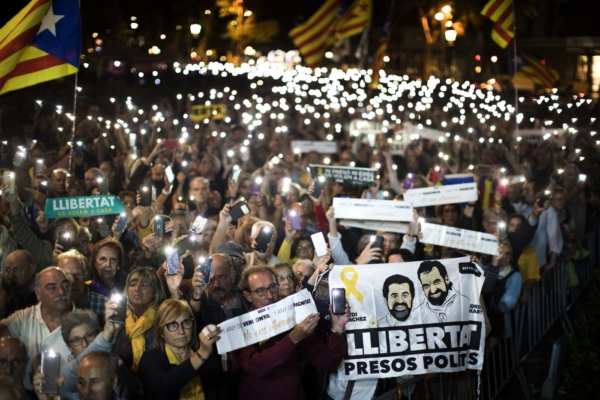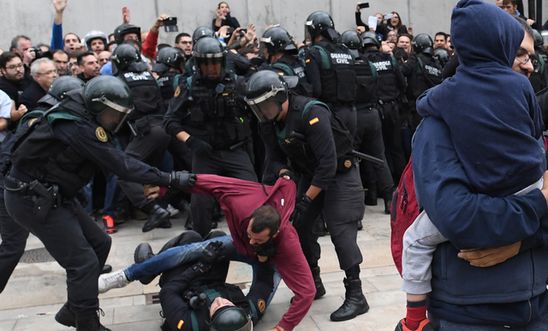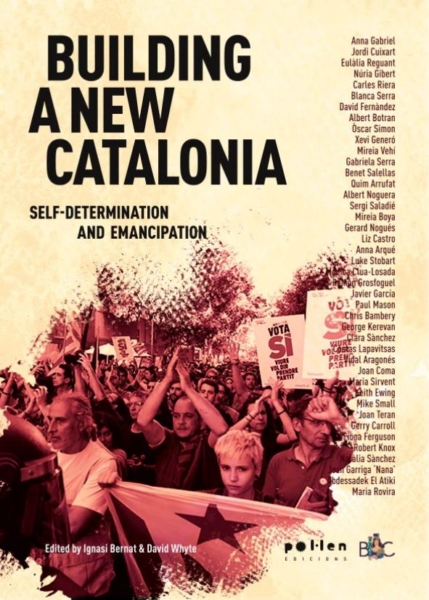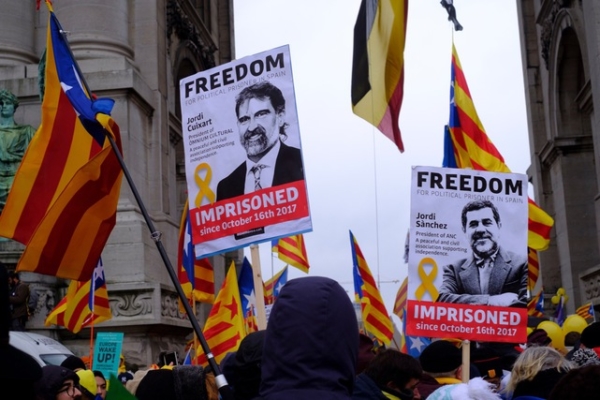A Country of Shared Struggles
 An extract from ‘Building A New Catalonia, Self-Determination and Emancipation’ published by Pol-len edicions and Bella Caledonia.
An extract from ‘Building A New Catalonia, Self-Determination and Emancipation’ published by Pol-len edicions and Bella Caledonia.
Book your tickets for the Scottish launch here.
“What we are as a people is not because of our essence, or because we share an immemorial past; instead it comes from what we’ve won, in the small struggles and big battles, in every corner of the country“.
This is how the philosopher Xavier Antich described the spirit of the Shared Struggles campaign, an initiative by the Òmnium Cultural association, sharing social and national battles together (as two sides of the same coin), over the last 60 years. A collective, necessary and sincere recognition of the thousands of anonymous fighters who have worked for the good of society, and who have worked to make neighbourhoods, cities, a country and a world just a little bit better. In this country nothing has been handed to us. We have filled the streets and lit up the public squares, we have fought for every one of our shared victories, giving it everything we’ve got. We believe that memory is the best seed to sow for a better future. If we can learn from the past then we can understand and share it, and we will be in a better position to change the present.
That is how we are celebrating the 40th anniversary of the Catalan Assembly: by honouring the struggle for decent housing in Vallès in the 1970s, the women’s strike of 1976 at Motor Ibérica, the neighbourhood movement that took hold of buses in Pomar in Badalona in 1985, and the environmental fights to save the volcanoes in La Garrotxa. There can be no victory without struggle. We are humble followers of our poet Montserrat Roig: “If one thing is a true act of love, it is remembrance“.
The Shared Struggles campaign is an act of sincere and collective love and recognition of all the men and women, full of hope, who never stopped believing that a better world was possible. Fighters like those mentioned by Montserrat Roig in her biography Els Catalans als Camps Nazis (Catalans in the Nazi Camps), who fought against the greatest indignity of the human condition, keeping the flame of justice, freedom and dignity alive on the darkest nights. In much harder times, they never faltered. Her legacy is humbling, and means we too can never falter. This campaign has given us the opportunity to discuss the kind of country we are living in, and the one we want to build together.
We can debate the collective benefits that are now at risk, and the social situations that have hit the most disadvantaged. We can argue for the need to live in a society with equal opportunities for all, with coexistence between equals as put in place by the Catalan school system. My mother is from Murcia and my father from Badalona. A butcher and a factory worker, respectively. They were parents who, like the vast majority of parents at the time, were hard-working people who were not especially militant or disenchanted. When you have a job to make ends meet, as was their case, you often don’t have much time to devote yourself to anything else. On the other hand, chance meant that we grew up spending a lot of time around the butchers, in the town centre of Santa Perpètua de Mogoda, holding onto our mother’s skirts, in a very Catalan environment. It was a town in which people were proud to be working class, with a national awareness inherited from the Unified Socialist Party of Catalonia (PSUC), and from parishes linked to the community and the surrounding area, which was also strongly committed to everything related to popular culture. I grew up with my siblings in the heart of a Spanish-speaking family with little associated Spanish culture. It was my mother who said one day, as my father often proudly recounts: “Hey listen, if we’re living in Catalonia then why don’t we speak to the kids in Catalan?” And my father replied, “Ah, alright then”. If he had replied otherwise then it’s possible that, today, I would not be president of the Òmnium Cultural.
There is nothing particular special about this story, but it is clear that this is not the success of an individual, but the success of the community. I could be talking about any of the hundreds of thousands of Catalans who have had the same experience. My experience is one among many in Catalonia. Situations in which Spanish (alongside hundreds of other languages from around the world) was and is spoken every day. People who have never given up what they speak at home, and who instead feel the Catalan language is also theirs, without asking for permission or asking anyone to renounce their own language.
 That is why we defended the struggle of parents at Santa Coloma de Gramenet, the majority of whom were Spanish-speakers, who in 1982 led the drive for linguistic immersion, the pillar of the Catalan school model. The initiative was a success for social cohesion and equal opportunities. Perhaps they are one of the best examples of shared struggles. At the time, the Òmnium Cultural was training the first Catalan teachers. Today, through Somescola, it continues to defend this model to avoid linguistic segregation in schools. At my school however, in that very same Catalan school, some of the children called me “the Catalan”. I got back home and said: “Wow, am I really ‘the Catalan’?” My mother, a woman from Murcia, told me: “Jordi, don’t worry because we are all Catalans”.
That is why we defended the struggle of parents at Santa Coloma de Gramenet, the majority of whom were Spanish-speakers, who in 1982 led the drive for linguistic immersion, the pillar of the Catalan school model. The initiative was a success for social cohesion and equal opportunities. Perhaps they are one of the best examples of shared struggles. At the time, the Òmnium Cultural was training the first Catalan teachers. Today, through Somescola, it continues to defend this model to avoid linguistic segregation in schools. At my school however, in that very same Catalan school, some of the children called me “the Catalan”. I got back home and said: “Wow, am I really ‘the Catalan’?” My mother, a woman from Murcia, told me: “Jordi, don’t worry because we are all Catalans”.
This is another important lesson. In the Catalan countries, you are judged on where you are going, not where you came from. Because we want a society in which everyone, including the children of immigrants, can build their own life; where disadvantaged people know they can count on social institutions, and where a brave and united society recognises strength in diversity. Our challenge is to ensure that we are never divided as a people, and the best way to achieve this is by strengthening and normalising the collective vision for the country, once and for all, allowing us all to identify with our part of the society of the Catalan countries as a whole. Catalan society of the 1960s has given way to a society in which over 300 languages are spoken, and there is a seemingly endless array of different countries of origin, cultures and beliefs. In a society where migration is structural, finding shared ground becomes a huge challenge that is crucially important to overcome if you believe it will guarantee equal opportunities for all citizens. We should help to create a certain pride in the migration that has let us become an open, brave society that will not submit.
That is why we want to see a vision that is richer if everyone contributes what is most important to them, a collective vision that is stronger if everyone can identify some of their most sincere beliefs within it. In the political process that is on going in the Principality, however, our discourse does not aim to separate anyone, and we are not trying to be sly. We are now and will continue to be sincere and honest, because that is the only way to build solid, long-term community projects.
When we say we want to contribute to social cohesion, we are highlighting the need to ensure progress and freedom. We hope to be a united people that moves forward decidedly when there is a shared consensus, such as the desire for a fairer society. The victory for a guaranteed income is a good example. We find other examples in the community initiatives built from the social economy. With the legacy of 55 years of history and the strength of 66,000 members and 40 regional offices, Òmnium Cultural continues to work towards social cohesion. For example, it runs the Lliures Project (projectelliures.cat), a charitable economic fund, alongside Coop57 and ECAS. The project’s aim is to encourage everyone to fight social injustice, through organised and effective direct action.
We believe in responsibility between citizens, civil society and Catalan institutions to reverse some of the statistics that eradicate our dignity: to take 1.5 million people out of poverty and combat the figures that show that 21% of the population is at risk of social exclusion. Between all of us, we must build a more solid foundation to combat the root causes of social problems, and to turn fear into a collective sense of hope. The shared struggles of the past should become the shared struggles of the present.
Today we are learning from large-scale movements, with Òmnium Cultural standing side by side with the pro-independence organisation the National Catalan Assembly (ANC), and taking on the spirit of “yes we can” from the Platform for People Affected by Mortgages (PAH). We are learning too from volunteers from the EKO community, who fight for the rights of refugees, and the bravery of those refugees who are fighting for a decent life. We cannot win the present or the future for our children without defending sovereignty, democracy and social rights.
Social issues are a collective challenge faced by society and the country that goes beyond independence. In defence of social rights and democracy, institutions and civil society must be united. It is the only guarantee to win against a Spanish government that denies our sovereignty. A Spanish state that not only takes away the democratic right of self-determination but is also willing to overturn emergency housing laws. They are two sides of the same coin. We live in a weak Spanish state, in which the most powerful and inflexible live alongside the most vulnerable. A state that refuses to accept the thousands of refugees fleeing from the Syrian war, that prevents our economy and welfare from improving, drowning us in outdated infrastructure, promising investments that are never made, carrying out a violent campaign against train passengers who have seen their rights systematically abused, and including the suffering of retirees who have been affected by fuel poverty. The challenges of the present are hard to face, such as combating the patriarchy, fully accepting sexual orientation, and the normalisation and inclusion of people with disabilities.
Because all Catalans, without exception, will be the founding citizens of the Catalan Republic, it is essential for us to feel united as a community. To do this, as we often say, the important things are not which flag why are flying, but rather the aim of achieving a better country for all. Today, as every day, we humbly pledge our faithful commitment to the many anonymous people fighting for a better country.
As we are reminded by Francesc Candel: “Together we are one people!”. To that we add: “We will leave no one behind.”
*
 Join us for the Edinburgh launch of Building A New Catalonia, with Mike Small & Ignasi Bernat and contributors from the book on Wednesday, Apr 10 2019 19:30 – 21:30 at The Counting House, West Nicholson Street, Edinburgh.
Join us for the Edinburgh launch of Building A New Catalonia, with Mike Small & Ignasi Bernat and contributors from the book on Wednesday, Apr 10 2019 19:30 – 21:30 at The Counting House, West Nicholson Street, Edinburgh.
A vibrant, thoughtful, incredibly timely new book, Building A New Catalonia articulates the political strategies and aspirations of the anti-capitalist, feminist and socialist struggles for self-determination in Catalonia in a series of 35 short and sharply written essays. It brings together the leading voices of Catalonian left independence movement alongside key figures in the international solidarity movement.
The book includes chapters by Catalan political leaders including Jordi Cuixart (currently in jail awaiting trial for sedition), Liz Castro and David Fernandez, and prominent international contributors including journalist Paul Mason and economist Costas Lapavitsas.

